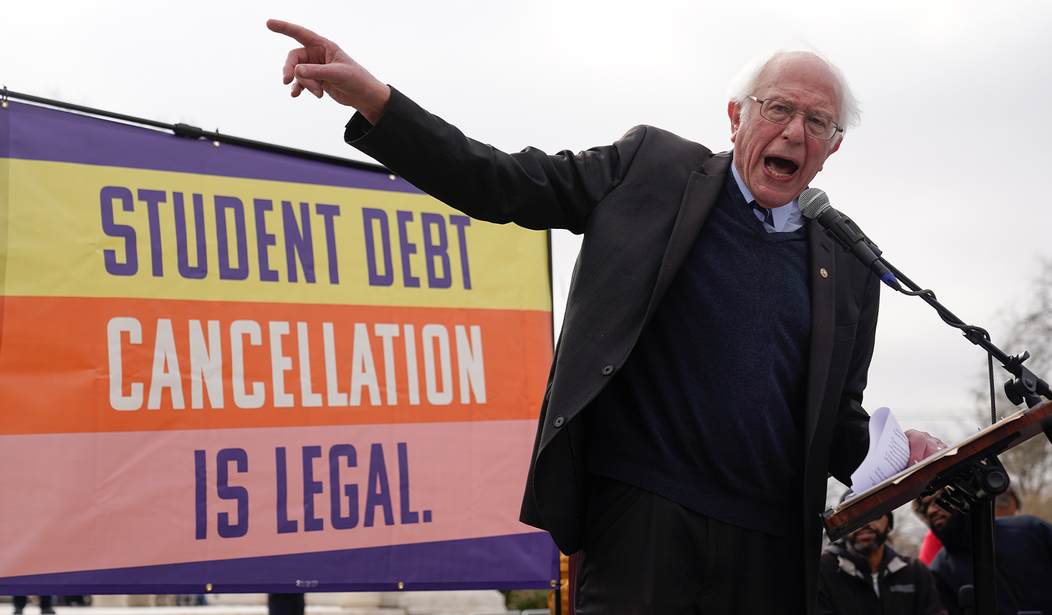Democratic Socialist Senator Bernie Sanders, the author of "It's OK To Be Angry About Capitalism," has introduced yet another bill that would mandate most employers to shift to a four-day work week for employers or pay hefty penalties to those still working a normal schedule. Dubbed the Thirty-Two Hour Workweek Act, Sanders insists that his bill is "not a radical idea" and would benefit both workers and employers. This type of fanciful socialist thinking has taken root in several European nations already, much to the consternation of most employers. But Sanders sees it as the wave of the future. That may be true, but for a variety of obvious reasons, it would be a future of increasing socialism and decreasing productivity. (Fox Business)
Vermont Sen. Bernie Sanders has unveiled a plan that would create a 32-hour workweek with no loss of pay.
The independent lawmaker, chairman of the Senate Committee on Health, Education, Labor, and Pensions (HELP) and a self-described democratic socialist, said his bill to establish a four-day workweek is not radical and would lead to a better quality of life for millions of Americans.
"Moving to a 32-hour workweek with no loss of pay is not a radical idea," Sanders said in a press release. "Today, American workers are over 400 percent more productive than they were in the 1940s. And yet, millions of Americans are working longer hours for lower wages than they were decades ago. That has got to change."
Sanders' bill, titled the Thirty-Two Hour Workweek Act, would reduce the standard workweek from 40 hours to 32 hours over four years by lowering the threshold for overtime pay for non-exempt employees.
Some people have argued in favor of companies scheduling four ten-hour days as opposed to five eight-hour days. That's still problematic for many companies, but at least employers would be receiving the same amount of work for the same pay. But that's not what Bernie Sanders is proposing. He wants a 32-hour work week with no reduction in pay. Companies scheduling workdays of more than eight hours would be required to pay time and a half for the entire day, not just the extra hours. Any workday reaching twelve hours would have to pay double time.
Almost any employer or anyone who has studied economics can tell you that the fundamental mechanics of a proposal such as this simply don't work. Companies exist for the sole purpose of providing goods and/or services and they generally require employees to make that happen. If the government suddenly mandates a reduction in the available amount of labor, output decreases and revenue falls. Alternatively, Sanders can demand an increase in the cost of labor to produce the current level of goods and services, but that drives up the employer's labor costs considerably. To make up for that, the company would need to increase prices, further impacting all consumers. (Not that the Democrats seem to care much about that.)
Sanders counters these arguments by saying that recent advances in Artificial Intelligence are already making it easier for employers to be more productive with less human labor. That argument is, if anything, even crazier than the original proposal. The government is already seeking ways to rein in AI precisely to stem the threat it poses to human workers. Why would employers give workers shorter hours or more pay if they can simply replace them with AI?
Underlying this entire debate is the toxic, socialist nature of what Sanders is proposing. Companies do not exist with the primary purpose of providing jobs and paychecks, despite what Bernie Sanders may believe. They exist to generate a profit by being competitive. The jobs and paychecks are simply a happy side-effect of that model. The only employment that exists outside that model involves working for the government, which is, of course, the socialist ideal. One look at our national debt will show you how functional that model is.
On an even deeper level, we have to remember that work and the ability to earn a living through one's own efforts is a fundamental principle of an independent capitalist system. That concept is part and parcel of what built America into the dynamo it eventually became. Socialism seeks to devalue work and independence, substituting dependence on the government and a loss of individuality in place of those ideals. Shifting to a shorter work week and kneecapping capitalist principles in the private sector would simply be another step on the road to that form of societal collapse.








Join the conversation as a VIP Member